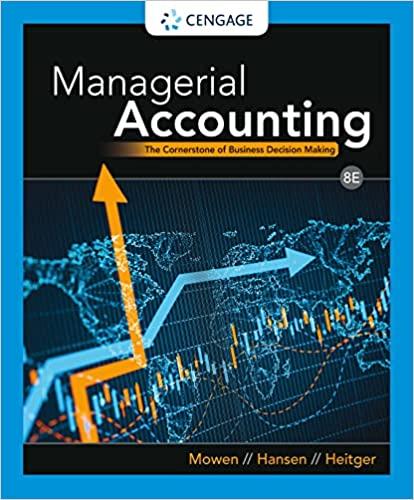Answered step by step
Verified Expert Solution
Question
1 Approved Answer
Choose the right answer: 8. To assign costs to cost objects, we classify costs into a) direct costs / indirect costs b) direct materials /
Choose the right answer: 8. To assign costs to cost objects, we classify costs into a) direct costs / indirect costs b) direct materials / direct labor c) prime costs / conversion costs d) selling costs / administrative costs 9. Prime cost is a) sum of direct materials and direct labor b) sum of direct materials and selling costs c) sum of direct labor and manufacturing overhead d) sum of manufacturing overhead and administrative costs 10. Conversion cost is a) sum of direct labor and manufacturing overhead b) sum of manufacturing overhead and administrative costs c) sum of direct materials and selling costs d) selling costs and administrative costs 11. For financial accounting purposes, we classify the costs into a) relevant costs and irrelevant costs b) product costs and period costs c) variable costs and fixed costs d) sunk costs and opportunity costs 12. Product costs a) include direct materials, direct labors and selling costs. b) attach to a unit of product as it is manufactured and stay attached to each unit of product until it is sold. c) are released from inventory as expenses when products are produced. d) are not inventoriable. please choose "True" or "False" of the following statements: 13. A fixed cost is a cost that remains constant, in total, regardless of changes in the level of activity. 14. Manufacturing overhead usually includes various fixed costs such as depreciation, insurance, property taxes, rent, and supervisory salaries. 15. Cost behavior refers to how a cost reacts to changes in the level of activity. 16. A variable cost varies, in total, in direct proportion to changes in the level of activity. 17. Assume that a company paid $50,000 several years ago for a special-purpose machine. The machine was used to make a product that is now obsolete and is no longer being sold. The $50,000 should be considered in decision making. 18. Under variable costing, only those manufacturing costs that vary with output are treated as product costs. 19. Under variable costing, fixed manufacturing overhead is treated as a product cost. 20. Absorption costing treats all manufacturing costs as product costs, regardless of whether they are variable or fixed. 21. In absorption costing, fixed manufacturing overhead costs are included in work in process inventory. 22. Net operating income under absorption costing and net operating income under variable costing can be different. 23. Net operating incomes are same between absorption costing and variable costing because the two methods account for fixed manufacturing overhead identically
Step by Step Solution
There are 3 Steps involved in it
Step: 1

Get Instant Access to Expert-Tailored Solutions
See step-by-step solutions with expert insights and AI powered tools for academic success
Step: 2

Step: 3

Ace Your Homework with AI
Get the answers you need in no time with our AI-driven, step-by-step assistance
Get Started


